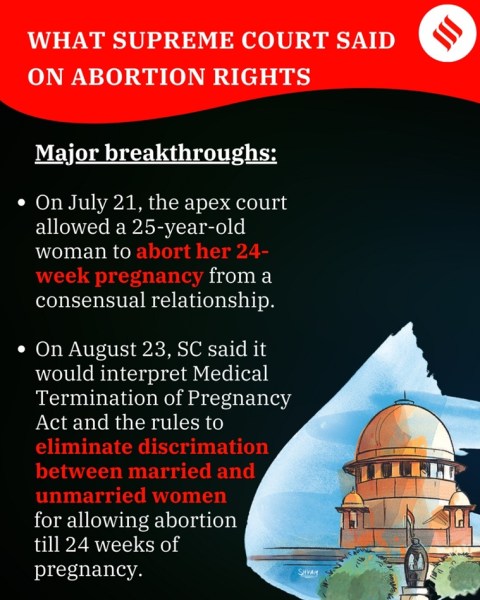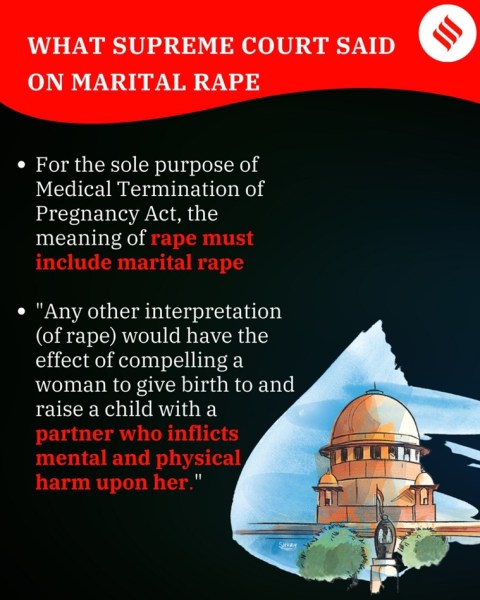
[ad_1]
In a significant ruling on reproductive rights, the Supreme Court Thursday extended the right to safe and legal abortion up to 24 weeks of pregnancy to unmarried and single women, saying it is the “right of every woman to make reproductive choices without undue interference from the State”.
Now, all women in the country, regardless of marital status, can undergo an abortion up to 24 weeks into pregnancy.
The bench of Justices D Y Chandrachud, A S Bopanna and J B Pardiwala, ruling on a plea by an unmarried pregnant woman who had been in a consensual relationship but was denied the right to abortion because she was past the 20-week limit, made it clear that provisions of the Medical Termination of Pregnancy Act cannot be interpreted to deny that right to single women beyond 20 weeks of pregnancy.
If the Act and Rules, the bench said, were “to be interpreted such that its benefits extended only to married women, it would perpetuate the stereotype and socially held notion that only married women indulge in sexual intercourse, and that consequently, the benefits in law ought to extend only to them”.
“This artificial distinction between married and single women is not constitutionally sustainable. The benefits in law extend equally to both single and married women,” it said.
Article 21 of the Constitution “recognises and protects the right of a woman to undergo termination of pregnancy if her mental or physical health is at stake. Importantly, it is the woman alone who has the right over her body and is the ultimate decision-maker on the question of whether she wants to undergo an abortion… Depriving women of autonomy not only over their bodies but also over their lives would be an affront to their dignity,” it said.
The bench also said that the meaning of rape must include marital rape for the purpose of the MTP Act.

“The meaning of rape must… be understood as including marital rape, solely for the purposes of the MTP Act and any rules and regulations framed thereunder. Any other interpretation would have the effect of compelling a woman to give birth to and raise a child with a partner who inflicts mental and physical harm upon her,” it said.
The bench, which went into provisions of the MTP Act of 1971 and its 2021 amendment, said “the Act of 1971 was largely concerned with ‘married women’… Significantly, the 2021 Statement of Objects and Reasons does not make a distinction between married and unmarried women. Rather, all women are entitled to the benefit of safe and legal abortions”.
Pointing out that “the whole tenor of the MTP Act is to provide access to safe and legal medical abortions to women”, it said “being a beneficial legislation, the provisions of the MTP Rules and the Act must be imbued with a purposive construction… in consonance with the legislative purpose”.
On the evolution of the law on abortion, the bench said “while much of law’s benefits were (and indeed are) rooted in the institution of marriage, the law in modern times is shedding the notion that marriage is a precondition to the rights of individuals (alone or in relation to one another). Changing social mores must be borne in mind when interpreting the provisions of an enactment to further its object and purpose”.
It said “transformative constitutionalism promotes and engenders societal change by ensuring that every individual is capable of enjoying the life and liberties guaranteed under the Constitution” and “the law must remain cognizant of the fact that changes in society have ushered in significant changes in family structures”.
 The bench also said that the meaning of rape must include marital rape for the purpose of the MTP Act.
The bench also said that the meaning of rape must include marital rape for the purpose of the MTP Act.
“In the evolution of the law towards a gender-equal society, the interpretation of the MTP Act and MTP Rules must consider the social realities of today and not be restricted by societal norms of an age which has passed into the archives of history. As society changes and evolves, so must our mores and conventions. A changed social context demands a readjustment of our laws. Law must not remain static and its interpretation should keep in mind the changing social context and advance the cause of social justice,” it said.
The bench said that “the decision to give birth to and raise a child is necessarily informed by one’s material circumstances… the situational, social, and financial circumstances of a woman or her family… Each woman’s circumstances are unique… It is ultimately the prerogative of each woman to evaluate her life and arrive at the best course of action, in view of the changes to her material circumstances”.
It said “the impact of the continuance of an unwanted pregnancy on a woman’s physical or mental health should take into consideration various social, economic, and cultural factors operating in her actual or reasonably foreseeable environment”.
The “decision to have or not to have an abortion is borne out of complicated life circumstances, which only the woman can choose on her own terms without external interference or influence. Reproductive autonomy requires that every pregnant woman has the intrinsic right to choose to undergo or not to undergo abortion without any consent or authorisation from a third party”.
Stating that “the right to reproductive autonomy is closely linked with the right to bodily autonomy… The consequences of an unwanted pregnancy on a woman’s body as well as her mind cannot be understated… A mere description of the side effects of a pregnancy cannot possibly do justice to the visceral image of forcing a woman to continue with an unwanted pregnancy. Therefore, the decision to carry the pregnancy to its full term or terminate it is firmly rooted in the right to bodily autonomy and decisional autonomy of the pregnant woman”, it said.
“The right to decisional autonomy also means that women may choose the course of their lives. Besides physical consequences, unwanted pregnancies which women are forced to carry to term may have cascading effects for the rest of her life by interrupting her education, her career, or affecting her mental well-being,” it said.
.
.
.
.
[ad_2]
Source link